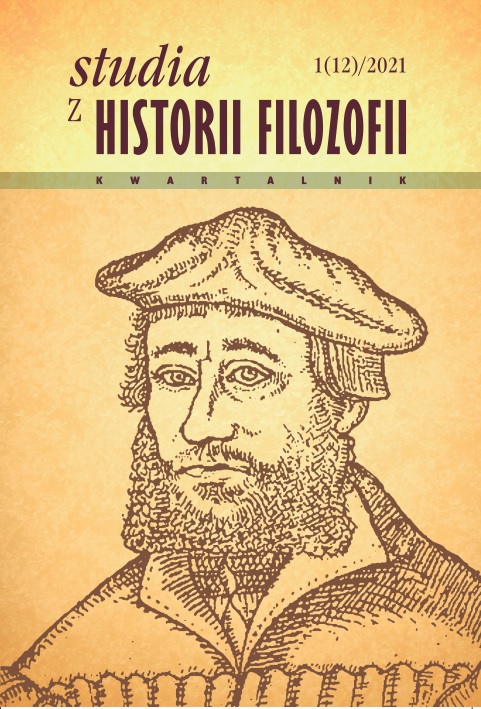The Problem of Weakness of Will in the Philosophy of Leibniz in the Context of Early Modern Indeterministic Freedom Theories
DOI:
https://doi.org/10.12775/szhf.2021.001Keywords
acrasia, Bramhall, freedom, incontinence, indeterminism, Molina, Leibniz, Spener, weakness of will, willAbstract
The article examines the coherence of Leibnizian conception of the weakness of will in context of early modern radical indeterminist theories of freedom. In the first step Leibniz’ position to the late scholastic molinistic paradigm of freedom (L. Molina) is explained. After that, the seventeenth-century argumentation strategies for indeterminism concerning the possibility of voluntarily performing morally bad actions against all the reasons (J. Bramhall and P.J. Spener) are presented. Finally, in reference to the presented theories the plausibility of Leibniz’ theory of weakness of will and its connection to freedom understood as ability of performing morally bad actions is examined.References
Źródła
Bramhall John. 1996. A Defence of True Liberty from Antecedent and Extrinsecall Necessity. Routledge: Thoemmes Press.
Leibniz Gottfried Wilhelm. 1994. Confessio Philosophi, Frankfurt am Main: Klostermann Verlag.
Leibniz Gottfried Wilhelm. 1955. Nowe rozważania dotyczące rozumu ludzkiego, t. 1, przeł. Izydora Dąmbska, Warszawa: PWN.
Leibniz Gottfried Wilhelm. 1947. Plädoyer für Gottes Gottheit (Causa Dei), red. i tłum. Karl Kindt, Berlin: Wichern Verlag.
Leibniz Gottfried Wilhelm. 1994. „Przyczyna pochodząca od Boga, potwierdzona przez Jego sprawiedliwość oraz zgodne z nią połączone pozostałe doskonałości i ogół działań. W:Gottfried Wilhelm Leibniz. „Pisma z teologii mistycznej”. W: Pisma z teologii mistycznej, red. Małgorzata Frankiewicz. Kraków: Znak.
Leibniz Gottfried Wilhelm. 2001. Teodycea. O dobroci Boga, wolności człowieka i pochodzeniu zła, tłum. Małgorzata Frankiewicz. Warszawa: PWN.
Molina Ludovicus. 1953. Liberi arbitrii cum gratiae donis, divina praescientia, providentia, praedestinatione et reprobatione Concordia, red. Iohannes Rabeneck S. I. Oña/Madrid: Sapientia.
Spener Philipp Jakob. 1994. „Der hochwichtige Articul Von der Wiedergeburt“. W: Philipp Jakob Spener, Schriften, red. Erich Beyreuther, t. 7. Hildesheim: Olms.
Literatura przedmiotu
Aichele Alexander. 2015. „Der Mensch denckts, Gott lenckts“. G. Fr. Meiers Versuch eines kompatibilistischen Freiheitsbegriffs“. W: G. Fr. Meier (1718–1777). Philosophie als „wahre Weltweisheit“, red. Frank Grunert, Gideon Stiening, 231–244. Berlin/Boston: Walter De Gruyther.
Backus Irena. 2016. Leibniz. Protestant Theologian. Oxford: Oxford University Press.
Bremer Józef. 2013. Czy wolna wola jest wolna? Kraków: WAM.
Chappell Vere. 1999. Hobbes and Bramhall on Liberty and Necessity. Cambridge: Cambridge University Press.
Clarke Randolph. 2003. Libertarian Accounts of Free Will. Oxford: Oxford University Press.
Davidson Donald. „Jak możliwa jest słabość woli?”. W: Filozofia moralności. Postanowienie i odpowiedzialność moralna, red. Jacek Hołówka. Warszawa: Aletheia.
Gut Przemysław. 2016. „Za co Leibniz krytykował Kartezjański pogląd na wolną wolę?”. Przegląd Filozoficzny – Nowa Seria 4, 100: 373–374.
Kane Robert. 1985. Free Will and Values. New York: SUNY Press.
Kane Robert. 1996. The Significance of Free Will. Oxford: Oxford University Press.
Saarinen Risto. 2011. Weakness of Will in Renaissance and Reformation Thought. Oxford: Oxford University Press.
Szyrwińska Anna. 2017. Wiedergeborene Freiheit. Der Einfluss des Pietismus auf die Ethik Kants. Wiesbaden: Springer Verlag.
Downloads
Published
How to Cite
Issue
Section
Stats
Number of views and downloads: 1020
Number of citations: 0



